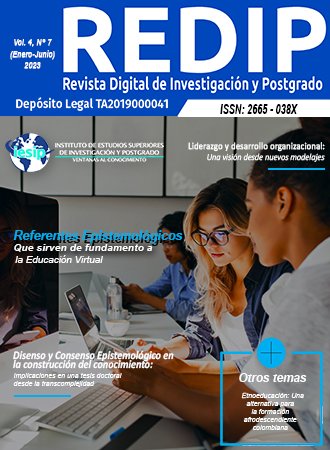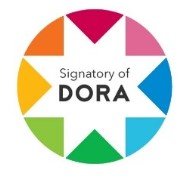Epistemological references that serve as athe basis of Virtual Education
DOI:
https://doi.org/10.59654/603t4s87Keywords:
Virtual education, epistemological references, Vigotsky, Piaget, Brunner, Siemens..Abstract
This article makes a hermeneusis of some epistemological references that serve as foundations for virtual education. In the first place, constructs of great value in Vigotsky's constructivist theory such as mediation, Zone of Proximal Development and scaffolding emerge. Secondly, Piaget's genetic theory where the functions of cognition stand out: adaptation and equilibration, action and the stages of cognitive development. Thirdly, Brunner's theory of instruction with its concepts of
representation and the different evolutionary moments in which it develops: enactive, iconic and symbolic. Also, learning by discovery. Finally, Siemens' connectivist learning theory explains the effect that technology has had on the way we communicate, learn and live.
Downloads
References
Adell, J. y Castañeda, L. (2013). El ecosistema pedagógico de los PLEs. En: Entornos Personales de Aprendizaje: Claves para el ecosistema educativo en red, Castañeda, L. Adell, J. (Ed). Editorial Marfil S.A, 29-52. https://sitios.uao.edu.co/docentes/wp-content/uploadssites/26/2019/05/el-ecosistema-pedagogico-de-los-ples-capitulo2.pdf
Arancibia, C. V., Herrera, P. P. y Strasser, S. K. (2008). Manual de Psicología Educacional. Sexta edición ampliada. Ediciones Universidad Católica de Chile.
Bartolomé, A. (2011). Conectivismo: aprender em rede e na rede. En A. Bartolomé, Tecnologías na educacao: Uma abordagem crítica para uma atualizacao practica. pp-71-86. https://www.researchgate.net/publication/255937655_Conectivismo_aprender_em_rede_e_na_rede
Brainerd, C. J. (2003). Jean Piaget, learning research, and american education. En B. Zimmerman & D. Schunk, Educational Psychology: a century of contributions. NJ: Erlbaum. https://www.researchgate.net/publication/232590219Jean_Piaget_learning_research_and_American_education
Bruner, J. S. (1963). El proceso de la educación. UTEHA.
Bruner, J. S. (1966). Toward a Theory of Instruction. Harvard University Press.
Bruner, J. S. (1988). Desarrollo educativo y educación. Morata.
Bruner, J. S. (1999). La educación, puerta de la cultura. Visor.
Camargo Uribe, A. y Hederich Martínez, C. (2010). Jerome Bruner: Dos teorías cognitivas, dos formas de significar, dos enfoques para la enseñanza de la ciencia. Psicogente, 13(24), 329-346. https://www.redalyc.org/articulo.oa?id=497552357008
Cientec. (2017). Laboratorios virtuales de química para simulación de experimentos en el computador. https://www.cienytec.com/edu2-software-laboratorio-virtual-quimica.htm#vrlab
Coll, C. (1998). La teoría genética y los procesos de construcción del conocimiento en el aula. En J. Castorina, C. Coll, A. Díaz, F. Díaz, B. García, G. Hernández, et al., (Eds.), Piaget en la educación (pp.17-52). México D.F.: Paidós.
Downes, S. (22 de diciembre de 2005). An Introduction to Connective Knowledge. https://www.researchgate.net/publication/248290359_An_Introduction_to_Connective_Knowledge
Downes, S. (2006). Learning networks and connective knowledge. https://philpapers.org/archive/DOWLNA.pdf
Downes, S. (2007, 3 de febrero). What Connectivism Is. [blog] Half an Hour. https://halfanhour.blogspot.com/2007/02/what-connectivism-is. html
Downes, S. (10 de julio de 2013). La condición semántica: conectivismo y aprendizaje abierto. [Vídeo online]. https://www.youtube.com/watch?v=Oth_9v3RcuI.
Gómez Alcívar, V., Henríquez Carrera, E. y Blaschke Guillén, G. (2020). El conectivismo en el proceso de enseñanza –aprendizaje significativo en el contexto actual. Revista Pertinencia Académica, 4(5), pp. 103-115. https://revistas.utb.edu.ec/index.php/rpa/article/view/2543
Herrera Batista, L. M. A. (2002). Las fuentes del aprendizaje en ambientes virtuales educativos. Reencuentro, (35), pp. 69-74. https://www.redalyc.org/pdf/340/34003507.pdf
Langford, P. E. (2005). Vygotsky's Developmental and Educational Psychology. New York, USA: Psychology Press is part of the Taylor & Francis Group. https://www.pdfdrive.com/vygotskys-developmental-and-educational-psychology-d38181708.html
López Garay, D. (2010). La valoración de la inteligencia humana según Jean Piaget: Hacia una reapropiación de sus aportaciones. Revista Pedagogía, 43(1), pp.35-47. https://revistas.upr.edu/index.php/educacion/article/download/16573/14126#:~:text=La%20%E2%80%9Cinteligencia%E2%80%9D%20humana%2C%20para,Piaget%2C%201955%2C%201968)
Molina, R. (2016). Tipos de aprendizaje en red. En R. Molina, Aprendizajes en red. Bogotá - Colombia: Universidad Distrital Francisco José de Caldas. https://es.scribd.com/document/501332468/Aprendizaje-en-Red
Piaget, J. (1972). Psicología de la inteligencia. Editorial Psique.
Rieber, R W., y Carton, A. S. (1987). The collected works of L S. Vygotsky, Vol. 1. New York: Plenum Press.
Siemens, G. (2004). Connectivism: A Learning Theory for the Digital Age. Traducción Diego E. Leal Fonseca, 2007. https://www.itdl.org/Journal/Jan_05/article01.htm
Siemens, G. (2006). Knowing knowledge. https://amysmooc.files.wordpress.com/2013/01/knowingknowledge_lowres-1.pdf
Solivellas, D. B. y Angeli, S. E. (2006). Hipertexto, Multimedia y Modelos de Aprendizaje Cognitivos: Reflexiones sobre sus Aportes al Desarrollo de Software Educativo. http://sedici.unlp.edu.ar/bitstream/handle/10915/19254/Documento_completo.pdfsequence=1&isAllowed=y
Valdez, A. F. J. (2010). Teorías educativas y su relación con las tecnologías de la información y de la comunicación (TIC). XVII Congreso Internacional de Contaduría Administración e Informática. pp. 1-14. Universidad Nacional Autónoma de México. Biblioteca del Consejo Latinoamericano de Educación Avanzada. https://clea.edu.mx/biblioteca/files/original/88d9d6779a5aab4815e05f82a90a4c7d.pdf
Vigotsky, L. S. (2000). El desarrollo de los procesos psicológicos superiores. Editorial Crítica.
Downloads
Published
Issue
Section
License
Copyright (c) 2023 Revista Digital de Investigación y Postgrado

This work is licensed under a Creative Commons Attribution-NonCommercial-ShareAlike 4.0 International License.
Esta licencia permite a los reutilizadores distribuir, remezclar, adaptar y desarrollar el material en cualquier medio o formato únicamente con fines no comerciales, y solo siempre que se atribuya al creador. Si remezclas, adaptas o construyes sobre el material, debes licenciar el material modificado bajo términos idénticos. CC BY-NC-SA incluye los siguientes elementos:
![]() POR: se debe dar crédito al creador.
POR: se debe dar crédito al creador.![]() NC: Sólo se permiten usos no comerciales de la obra.
NC: Sólo se permiten usos no comerciales de la obra.![]() SA: Las adaptaciones deben compartirse en los mismos términos.
SA: Las adaptaciones deben compartirse en los mismos términos.











